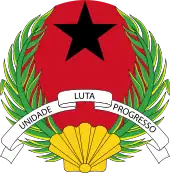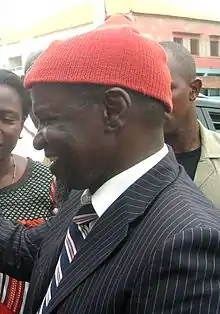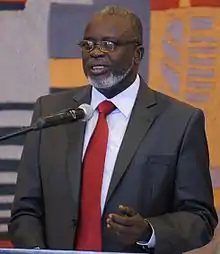|
| |||||||||||||||||
Presidential election | |||||||||||||||||
| |||||||||||||||||
| |||||||||||||||||
| |||||||||||||||||
 |
|---|
General elections were held in Guinea-Bissau on 28 November 1999, with a second round for the presidential election on 16 January 2000. The presidential election resulted in a victory for opposition leader Kumba Ialá of the Party for Social Renewal (PRS), who defeated Malam Bacai Sanhá of the ruling African Party for the Independence of Guinea and Cape Verde. The PRS were also victorious in the National People's Assembly election, winning 38 of the 102 seats.[1] This was the first time an opposition party won an election since the country's independence in the 1970s.
Voter turnout was 72% for the second round of the presidential election.[2]
Results
President
| Candidate | Party | First round | Second round | |||
|---|---|---|---|---|---|---|
| Votes | % | Votes | % | |||
| Kumba Ialá | Party for Social Renewal | 143,996 | 38.81 | 251,193 | 72.00 | |
| Malam Bacai Sanhá | African Party for the Independence of Guinea and Cape Verde | 86,724 | 23.37 | 97,670 | 28.00 | |
| Faustino Imbali | Independent | 30,484 | 8.22 | |||
| Fernando Gomes | Independent | 26,049 | 7.02 | |||
| João Tátis Sá | Independent | 24,117 | 6.50 | |||
| Abubacar Baldé | National Union for Democracy and Progress | 20,192 | 5.44 | |||
| Bubacar Rachid Djaló | Union for Change | 12,026 | 3.24 | |||
| Joaquim Baldé | Social Democratic Party | 8,623 | 2.32 | |||
| Salvador Tchongó | Resistance of Guinea-Bissau-Bafatá Movement | 6,937 | 1.87 | |||
| José Catengul Mendes | Struggle Front for the National Independence of Guinea | 5,311 | 1.43 | |||
| Mamadú Uri Baldé | Progress and Renewal Party | 3,580 | 0.96 | |||
| Antonieta Rosa Gomes | Guinean Civic Forum–Social Democracy | 2,986 | 0.80 | |||
| Total | 371,025 | 100.00 | 348,863 | 100.00 | ||
| Valid votes | 371,025 | 88.46 | 348,863 | 96.48 | ||
| Invalid/blank votes | 48,387 | 11.54 | 12,746 | 3.52 | ||
| Total votes | 419,412 | 100.00 | 361,609 | 100.00 | ||
| Registered voters/turnout | 503,007 | 83.38 | 503,007 | 71.89 | ||
| Source: African Elections Database, Rudebeck | ||||||
National People's Assembly
| Party | Votes | % | Seats | +/– | |
|---|---|---|---|---|---|
| Party for Social Renewal | 38 | +26 | |||
| Resistance of Guinea-Bissau-Bafatá Movement | 29 | +9 | |||
| African Party for the Independence of Guinea and Cape Verde | 24 | –38 | |||
| Union for Change | 3 | –3 | |||
| Social Democratic Party | 3 | New | |||
| Democratic Alliance | 3 | New | |||
| National Union for Democracy and Progress | 1 | New | |||
| Guinean League for Ecological Protection | 0 | – | |||
| Democratic Social Front | 1 | New | |||
| Struggle Front for the National Independence of Guinea | 0 | –1 | |||
| United Social Democratic Party | 0 | 0 | |||
| Guinean Civic Forum–Social Democracy | 0 | New | |||
| Party for Renewal and Progress | 0 | New | |||
| Total | 102 | +2 | |||
| Total votes | 432,604 | – | |||
| Registered voters/turnout | 525,329 | 82.35 | |||
| Source: Rudebeck, IFES | |||||
References
- ↑ Guinea-Bissau: Parliamentary Chamber: Assembleia nacional popular: Elections held in 1999 Inter-Parliamentary Union
- ↑ Elections in Guinea-Bissau African Elections Database
This article is issued from Wikipedia. The text is licensed under Creative Commons - Attribution - Sharealike. Additional terms may apply for the media files.

